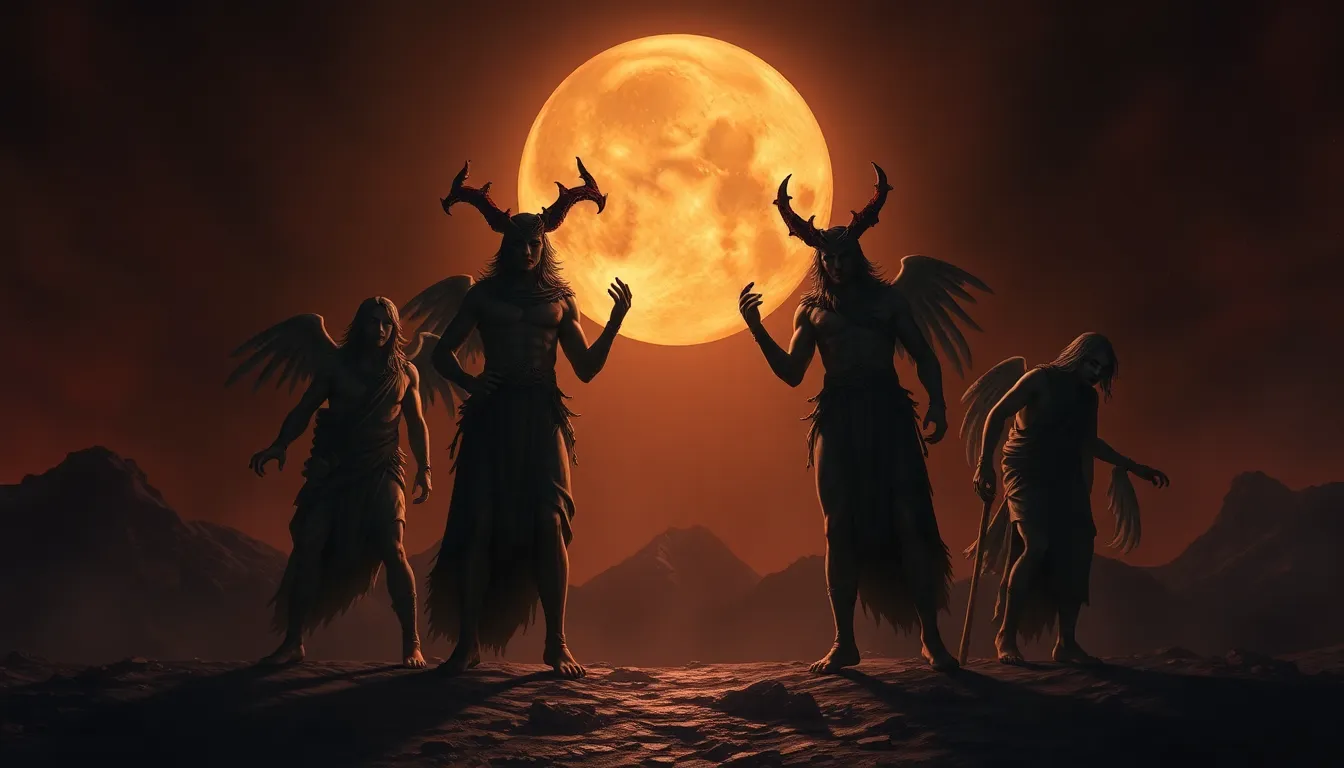The Furies and Their Connection to the Underworld in Greek Beliefs
I. Introduction
The Furies, also known as the Erinyes, are significant figures in Greek mythology, embodying the concepts of vengeance and retribution. These fearsome deities represent the darker aspects of justice, punishing those who commit grave offenses, particularly familial crimes such as murder. The Underworld, a central theme in Greek beliefs, serves as the realm of the dead and is intricately tied to the Furies’ role in ensuring moral order. This article explores the origins, roles, symbolism, and cultural impact of the Furies, as well as their connection to the Underworld.
II. Origins of the Furies
The Furies are believed to have originated from primordial beings in Greek mythology. Their genealogy varies, with some accounts stating that they were born from the blood of Uranus when he was castrated by Cronus. Others suggest they are the daughters of Nyx, the goddess of night, emphasizing their dark nature.
In ancient Greek culture, the Furies were revered and feared, as they represented the societal need for justice. Their presence was a reminder of the consequences of wrongdoing, instilling a sense of moral obligation among individuals.
Variations in their names and representations exist, including:
- Alecto – the unceasing
- Tisiphone – the avenger of murder
- Megera – the jealous one
Each of these names reflects their specific functions and attributes, showcasing the complexity of their character in Greek mythology.
III. The Furies’ Role as Avenging Spirits
The concept of justice and vengeance was paramount in Greek society. The Furies were seen as the enforcers of this justice, ensuring that wrongdoers faced consequences for their actions. Their role extended beyond mere punishment; they were also protectors of moral order.
The Furies were particularly active in punishing offenses against family, such as:
- Murder of a family member
- Incest
- Betrayal
Notable myths featuring the Furies include:
- The story of Orestes, who was pursued by the Furies after avenging his father’s murder.
- The tale of the curse of the House of Atreus, where familial betrayal led to a cycle of violence and retribution.
In these myths, the Furies serve as relentless pursuers, emphasizing the inescapable nature of justice and the consequences of one’s actions.
IV. Connection to the Underworld
The Furies hold a significant position as guardians of the Underworld. Their role extends beyond avenging wrongs in the mortal realm; they are also associated with the judgment of souls after death. In this capacity, they ensure that the dead receive their due consequences, interpreting the moral weight of their earthly actions.
The relationship between the Furies and Hades, the god of the Underworld, is complex. While Hades presides over the realm of the dead, the Furies enforce the moral order within it. They act as intermediaries between the living and the dead, ensuring that justice transcends mortality.
The Furies’ influence on the souls of the deceased can be seen as both protective and punitive. They guide the souls of the wrongdoers to face their fates while also providing a sense of hope for the virtuous, who may find peace in the afterlife.
V. Symbolism of the Furies
The Furies symbolize various themes, including guilt, retribution, and the consequences of one’s actions. They are often depicted as fearsome figures with snakes in their hair, embodying the terror that comes with divine vengeance.
The duality of their nature is particularly intriguing; while they serve as punishing agents, they also act as protectors of moral order. This duality is reflected in:
- Their role in ensuring justice is served
- Their association with the sanctity of familial bonds
Artistic depictions of the Furies throughout history showcase their terrifying presence. From ancient pottery to modern interpretations, they are often illustrated as fierce women, reinforcing their role as avengers.
VI. Cultural Impact and Legacy
The Furies have left a significant mark on literature and drama, particularly in works such as Aeschylus’s “Oresteia,” where they are central figures in the narrative. Their portrayal in these works highlights the complexities of justice and the moral dilemmas faced by characters.
Moreover, the Furies have influenced later interpretations of justice and morality across cultures. They serve as a reminder of the consequences of wrongdoing, echoing in modern discussions about ethics and law.
In contemporary pop culture, the Furies have found their way into various forms of media, including:
- Films that explore themes of vengeance and justice
- Literature that draws on their mythological background
- Video games that feature them as characters or antagonists
This cultural resonance underscores their enduring significance in the collective consciousness regarding justice and retribution.
VII. Comparative Analysis
The concept of avenging spirits is not unique to Greek mythology. Similar figures exist in other cultures, such as:
- The Furies (Erinyes) in Roman mythology
- The Valkyries in Norse mythology, who choose those who may die and those who may live in battles
- The Aztec Tzitzimime, who were believed to drag sinners to the underworld
When comparing the Furies to other deities of vengeance, one can see both similarities and differences. For instance, while the Furies punish wrongdoers, figures like Nemesis in Greek mythology serve more as personifications of retribution for hubris rather than persistent pursuers.
Across cultures, themes of justice and the afterlife remain prevalent, revealing a shared human concern for moral accountability and the consequences of one’s choices.
VIII. Conclusion
In summary, the Furies are complex figures in Greek mythology, representing the intricate relationship between justice, vengeance, and the Underworld. Their origins, roles, and symbolism reflect the ancient Greeks’ understanding of morality and the consequences of wrongdoing.
The enduring significance of the Furies in both ancient and modern contexts highlights their relevance in discussions about justice and morality today. As societies continue to grapple with these themes, the Furies stand as a powerful reminder of the importance of accountability and the moral order that governs human existence.




